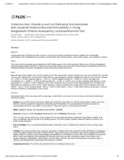| dc.contributor.author | Hossain, Md Iqbal | |
| dc.contributor.author | Haque, Rashidul | |
| dc.contributor.author | Mondal, Dinesh | |
| dc.contributor.author | Mahfuz, Mustafa | |
| dc.contributor.author | Ahmed, Am Shamsir | |
| dc.contributor.author | Islam, Mohammad Munirul | |
| dc.contributor.author | Guerrant, Richard Littleton | |
| dc.contributor.author | Petri, William Arthur | |
| dc.contributor.author | Ahmed, Tahmeed J. | |
| dc.date.accessioned | 2018-03-19T04:47:55Z | |
| dc.date.available | 2018-03-19T04:47:55Z | |
| dc.date.issued | 2016-12 | |
| dc.identifier.citation | Hossain, M. I., Haque, R., Mondal, D., Mahfuz, M., Ahmed, A. M. S., Islam, M. M., . . . Ahmed, T. (2016). Undernutrition, vitamin A and iron deficiency are associated with impaired intestinal mucosal permeability in young bangladeshi children assessed by lactulose/mannitol test. PLoS ONE, 11(12)10.1371/journal.pone.0164447 | en_US |
| dc.identifier.issn | 19326203 | |
| dc.identifier.uri | http://hdl.handle.net/10361/9687 | |
| dc.description | This article was published in the PLoS ONE [© 2016 Public Library of Science] and the definitive version is available at: http://doi.org/10.1371/journal.pone.0164447 The Journal's website is at: http://journals.plos.org/plosone/article?id=10.1371/journal.pone.0164447 | en_US |
| dc.description.abstract | Background: Lactulose/mannitol (L:M) test has been used as a non-invasive marker of intestinal mucosal-integrity and -permeability (enteropathy). We investigated the association of enteropathy with anthropometrics, micronutrient-status, and morbidity in children. Methods: The urine and blood samples were collected from 925 children aged 6±24 months residing in Mirpur slum of Dhaka, Bangladesh during November 2009 to April 2013. L:M test and micronutrient status were assessed in the laboratory of International Centre for Diarrhoeal Diseases Research, Bangladesh (icddr,b) following standard procedure. Results: Mean±SD age of the children was 13.2±5.2 months and 47.8% were female. Urinary-lactulose recovery was 0.264±0.236, mannitol recovery was 3.423±3.952, and L:M was 0.109 ±0.158. An overall negative correlation (Spearman's-rho) of L:M was found with age (rs = -0.087; p = 0.004), weight-for-age (rs = -0.077; p = 0.010), weight-for-length (rs = -0.060; p = 0.034), mid-upper-arm-circumference (rs = -0.098; p = 0.001) and plasma-retinol (rs = -0.105; p = 0.002); and a positive correlation with plasma α-1-acid glycoprotein (rs = 0.066; p = 0.027). However, most of the correlations were not very strong. Approximately 44% of children had enteropathy as reflected by L:M of ≥0.09. Logistic regression analysis revealed that younger age (infancy) (adjusted odds ratio (AOR) = 1.35; p = 0.027), diarrhea (AOR = 4.00; p = 0.039) or fever (AOR = 2.18; p = 0.003) within previous three days of L:M test were the risk factors of enteropathy (L:M of ≥0.09). Conclusions: Enteropathy (high L:M) is associated with younger age, undernutrition, low vitamin A and iron status, and infection particularly diarrhea and fever. | en_US |
| dc.language.iso | en | en_US |
| dc.publisher | © 2017 Public Library of Science | en_US |
| dc.relation.uri | http://journals.plos.org/plosone/article?id=10.1371/journal.pone.0164447 | |
| dc.subject | Vitamin A | en_US |
| dc.title | Undernutrition, vitamin A and iron deficiency are associated with impaired intestinal mucosal permeability in young Bangladeshi children assessed by lactulose/mannitol test | en_US |
| dc.type | Article | en_US |
| dc.description.version | Published | |
| dc.contributor.department | James P Grant School of Public Health, BRAC University | |
| dc.identifier.doi | http://doi.org/10.1371/journal.pone.0164447 | |

